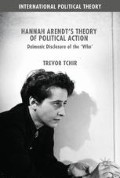Abstract
Chapter 1 introduces the two primary lines of exploration in the book, following a brief overview of Arendt’s life and works. Firstly, Arendt develops a concept of non-sovereign freedom experienced through political action that interrupts the existing processes and discloses ‘who’ the actor uniquely is, as it discloses the ‘world.’ By focusing on Arendt’s account of action’s disclosure of the ‘who,’ the book sheds light on many resources Arendt’s thought offers for understanding the contemporary political world, as well as several tensions within her work. Secondly, I suggest that Arendt’s engagement with the ‘daimon’ figure illustrates and performs some of the insoluble perplexities facing actors and spectators in the modern, secular public realm, with its complicated relationship to the residual vocabulary of the divine and transcendent.
Access this chapter
Tax calculation will be finalised at checkout
Purchases are for personal use only
Notes
- 1.
Arendt, Jewish Writings, 465.
- 2.
Dietz, “Arendt and the Holocaust,” 100.
- 3.
Ibid., 101–02.
- 4.
Arendt, Human Condition, 159–60.
- 5.
Kant, Critique of Judgment, 206.
Bibliography
Arendt, Hannah. The Human Condition. Chicago: University of Chicago Press, 1958.
Arendt, Hannah. On Violence. New York: Harcourt Brace Jovanovich, 1970.
Arendt, Hannah. Rahel Varnhagen: The Life of a Jewish Woman. Revised Edition. Translated by Richard and Clara Winston. New York: Harcourt Brace Jovanovich, 1974.
Arendt, Hannah. Between Past and Future. Enlarged edition. New York: Penguin Books, 1977.
Arendt, Hannah. On Revolution. New York: Penguin Books, 1977.
Arendt, Hannah. The Life of the Mind. San Diego: Harcourt, 1978.
Arendt, Hannah. Lectures on Kant’s Political Philosophy. Edited by Ronald Beiner. Chicago: University of Chicago Press, 1992.
Arendt, Hannah. Eichmann in Jerusalem. Revised and enlarged edition. New York, Penguin Books, 1994.
Arendt, Hannah. The Origins of Totalitarianism. New York: Harcourt, 1994.
Arendt, Hannah. Men in Dark Times. San Diego: Harcourt Brace & Company, 1995.
Arendt, Hannah. The Jewish Writings. Edited by Jerome Kohn and Ron H. Feldman. New York: Schocken Books, 2007.
Dietz, Mary G. “Arendt and the Holocaust.” In The Cambridge Companion to Hannah Arendt, edited by Dana Villa. Cambridge: Cambridge University Press, 2000.
Kant, Immanuel. The Critique of Judgment. Translated by J.H. Bernard. Amherst, NY: Prometheus Books, 2000.
Author information
Authors and Affiliations
Rights and permissions
Copyright information
© 2017 The Author(s)
About this chapter
Cite this chapter
Tchir, T. (2017). Introduction. In: Hannah Arendt's Theory of Political Action. International Political Theory. Palgrave Macmillan, Cham. https://doi.org/10.1007/978-3-319-53438-1_1
Download citation
DOI: https://doi.org/10.1007/978-3-319-53438-1_1
Published:
Publisher Name: Palgrave Macmillan, Cham
Print ISBN: 978-3-319-53437-4
Online ISBN: 978-3-319-53438-1
eBook Packages: Political Science and International StudiesPolitical Science and International Studies (R0)

